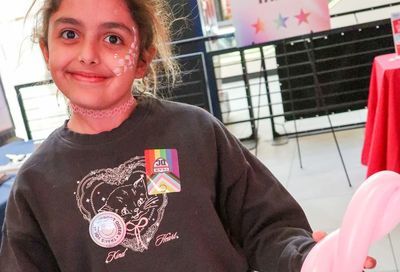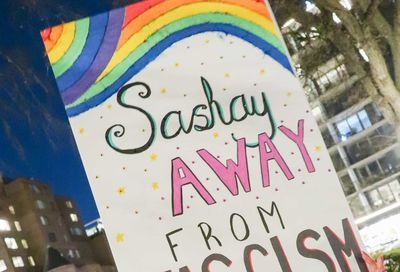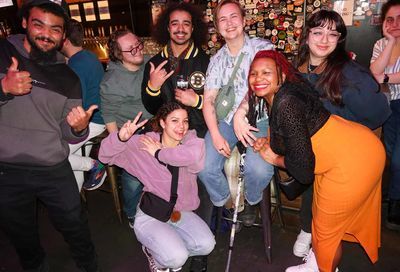First Class
Commentary: Alphabet Soup
In the coldest stretch of Iowa winter during my last two years of high school, there was a bittersweet part of each day: walking outside to the “Industrial Arts” building for journalism class, feeling the ice-cold wind whip against my face as I headed to a time and space that fulfilled me.
The same walk, through a covered breezeway that did little to protect us from the harsh elements, was pleasant enough in the spring and fall, except when it rained. Regardless of the weather, though, the destination was always worth the trek.
In that classroom I learned the basics of journalism and found an outlet for my writing hobby. With practice and encouragement, I gained the courage to approach strangers — I would come to know them as “sources” — for the purpose of interviewing them for news stories. The class published the student newspaper, the Purple & Gray, and I joined its staff as a writer my junior year.
Through my work on the P&G, as we called it, I discovered my calling. I still remember the conversation with my mother one night my senior year, when I broke it to her that I wanted to be a journalist instead of an orthodontist.
“But Kris,” she said, heartbroken, “what about the money?”
It was too late to change my mind; I’d been bitten by the bug. I was receiving a most excellent journalism education before I even went to college — I was learning how to write in the inverted pyramid style, and in a clean and engaging way.
The school was lucky enough to have a true professional advising the student newspaper — her name was Connie Riffel, and she taught us without talking down to us, engaged us without coddling us, and helped us publish an award-winning newspaper without doing our work for us. She encouraged us to work hard and showed us how, each month, our perseverance paid off with a product that would make us truly proud.
She’d join us on evenings and weekends for “work sessions” before the paper went to press, giving up her free time as readily as we gave up ours. She showed us how to use a typesetting machine — the precursor to today’s high-end laser printers. She taught us how to use word processing programs on the journalism classroom’s three computers, among the few in the school at that time. Their screens were dark gray-green with type that glowed bright orange.
We all adored her. She was young, as teachers go, and incredibly hip; so smart, so sensible. She was funny and clever, firm but fair. She didn’t put up with anyone’s crap, but most of us had no desire to give her any crap. She inspired us to do our best.
She generated something of a cult following among her students; one night we paid homage to her by camping out in tents on her front lawn, which was right across the street from our high school. She came out in the dark as we were setting up our domes, several of us, and tried to get us to go home. We said no way. As I remember it, she mentioned that her husband had suggested that she call the police. She told us she wouldn’t do that, and said we could stay as long as we kept quiet. Someone asked if we could use the bathroom. No way, she told us. She got the last laugh.
Mrs. Riffel taught me about journalism, but she also taught me about the hazards of perfectionism and the importance of perspective. I won second place in a news writing contest at a regional conference my journalism class attended, coming in just behind a boy from another school. I was angry and sullen on the bus ride home, and she was both empathetic — she was a self-described perfectionist too — and bewildered. She pointed out that winning second place in that contest was a big deal, told me I should be celebrating. She was right. She gave me a chance to enjoy my success.
In addition to her role in my academic life and what would become my professional life, she had a profound effect on me personally. She could see that I was suffering from depression, and she reached out to me, urging me to get help. She let me write letters to her when I was unable to look at her and articulate my feelings verbally. She’d write back to me, returning these thoughtful, helpful missives that always stressed the urgency of dealing with my depression while I was still young.
I never told her that I thought I might be gay. We talked and wrote about other things, but not that. She probably had an idea, because some of the creative writing I did at that time was pretty thinly veiled. But she was a consistent source of support for me, and at one point I wrote to her to thank her. I told her that someday I would in fact be happy, and when that day came, I told her, I’d write her a letter and tell her all about it.
“That’s great,” she replied, “but don’t write me a letter. Come and visit me and look me in the eye and talk to me.”
The year I graduated was Mrs. Riffel’s last year at my high school. She moved and I lost touch with her, although in the past several years I’ve tried occasionally to find her. I’m a pretty persistent Googler, so I never let more than a few months pass without looking again for someone I’m trying to find. Last week I tried again to track her down, and for the first time, I found a hit. It led me to her obituary, which told me that she had died three years earlier at age 51. She had cancer.
I have no idea how the news eluded me all this time. Her obituary ran in my hometown paper, which my mom and my brother still read. They knew she was important to me. I can’t explain that, but since I learned this news, I’ve been stunned and devastated. It’s a strange feeling, grieving so hard for someone I haven’t talked to for 17 years, someone who’s been dead for three years. Something about it is jarring.
I can’t go visit her now, I can’t send her a letter, I can’t look her in the eye and talk to her. But I can continue writing as a tribute to all that she taught me.
I can hope that will be enough to get me through this very peculiar form of loss.
Kristina Campbell can be reached at kcampbell@metroweekly.com.
Support Metro Weekly’s Journalism
These are challenging times for news organizations. And yet it’s crucial we stay active and provide vital resources and information to both our local readers and the world. So won’t you please take a moment and consider supporting Metro Weekly with a membership? For as little as $5 a month, you can help ensure Metro Weekly magazine and MetroWeekly.com remain free, viable resources as we provide the best, most diverse, culturally-resonant LGBTQ coverage in both the D.C. region and around the world. Memberships come with exclusive perks and discounts, your own personal digital delivery of each week’s magazine (and an archive), access to our Member's Lounge when it launches this fall, and exclusive members-only items like Metro Weekly Membership Mugs and Tote Bags! Check out all our membership levels here and please join us today!




















